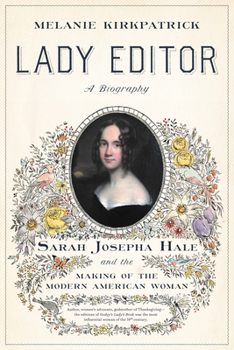Lady Editor: Sarah Josepha Hale and the Making of the Modern American Woman
Select Format
Select Condition 
Book Overview
For half a century Sarah Josepha Hale was the best known and most influential woman in America. As editor of Godey's Lady's Book, Hale was the leading cultural arbiter for the growing nation. Many turned to her for advice on what to read, what to cook, how to behave, and--most important--what to think. Twenty years before the declaration of women's rights in Seneca Falls, N.Y., Sarah Josepha Hale used her powerful pen to build popular acceptance of women's right to an education, their right to work, and their right to manage their own money.
There is hardly an aspect of nineteenth-century culture in which Hale did not figure prominently as a pathbreaker.Her stamp of approval helped advance the reputations of such writers as Edgar Allan Poe, Harriet Beecher Stowe, Nathaniel Hawthorne, and Henry Wadsworth Longfellow. She wrote the first antislavery novel, compiled the first-ever women's history book, and penned the most recognizable verse in the English language, "Mary Had a Little Lamb." She also introduced the Christmas tree and the white wedding dress to Americans. Thanksgiving wouldn't exist without Hale. She re imagined the New England festival as a patriotic national holiday and she conducted a decades-long campaign to persuade the public to coalesce around her idea. Abraham Lincoln took up her suggestion in 1863 and proclaimed the first in the series of national Thanksgivings that continues up to the present day. Today, most of the women's equity issues that Hale championed have been achieved, or nearly so. But women's roles in what she and her contemporaries called the "domestic sphere" are less valued today than in Hale's era. Hale's beliefs about women's special obligations to family, their moral leadership, and their principal role in preparing children to lead useful lives continue to have relevance at a time when many American women believe feminism has failed them and are seeking better answers.Format:Hardcover
Language:English
ISBN:164177178X
ISBN13:9781641771788
Release Date:August 2021
Publisher:Encounter Books
Length:324 Pages
Weight:1.34 lbs.
Dimensions:1.2" x 6.0" x 8.9"
Customer Reviews
0 rating






